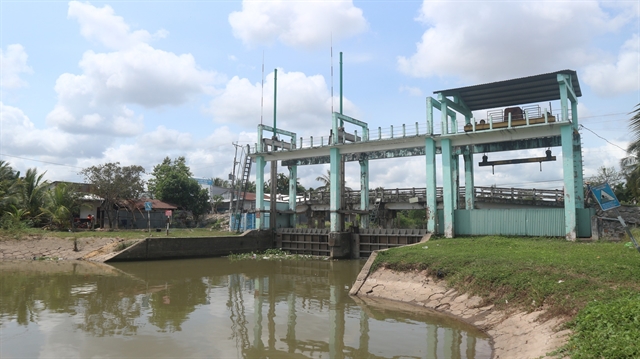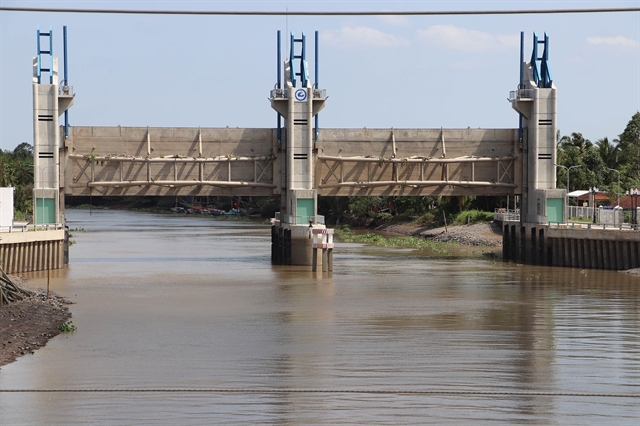 Society
Society

 |
| A sluice in the Rạch Gầm River in the Mekong Delta province of Tiền Giang is opened to irrigate rice crops when the water salinity level is low. – VNA/VNS Photo Minh Trí |
MEKONG DELTA – Saltwater intrusion up rivers is estimated to affect 29,260ha of rice sown in areas not zoned for the crop in the Cửu Long (Mekong) Delta as the region enters the peak dry season.
The areas are in Tiền Giang, Bến Tre, Trà Vinh, Sóc Trăng, and Cà Mau provinces, according to the Ministry of Agriculture and Rural Development's Department of Water Resources.
Delta farmers sowed 1.49 million hectares of rice in the winter-spring rice crop, and have harvested 575,000ha so far.
The region, the country’s largest rice, fruit and seafood producer, has taken various measures to cope with saltwater intrusion and lack of water for irrigation since the beginning of the dry season to mitigate their impacts on agriculture and people’s lives.
The delta’s 12 provinces and Cần Thơ City have upgraded and built saltwater prevention sluices and dams, dredged irrigation canals to store more water, and encouraged farmers to store water for irrigation and household use.
They also created rice sowing schedules in each locality and instructed farmers to follow them to avoid the worst of the saltwater intrusion.
The saltwater intrusion in the ongoing dry season – between November and April – is worse than normal, according to the department.
During high tides on March 7-13 and 24-28 the intrusion is expected to worsen, it said.
Salinity of four grammes per litre is estimated to occur 50-60km up major rivers during the high tide periods.
Most crops can only cope with a maximum of one gramme per litre.
The directorate has warned localities to strengthen monitoring of water resources and saltwater intrusion to adopt preventive measures.
Local authorities have warned farmers not to plant rice in saltwater-prone areas and to only begin sowing when there are rains and enough freshwater available.
Provinces have operated irrigation works efficiently to store water in irrigation canals, lakes and ponds.
They have also taken measures to supply water to households and help them store it for daily use.
In Cà Mau Province, some 12,000 households are facing a shortage, according to its Centre for Rural Clean Water and Environmental Sanitation.
Phan Hoàng Vũ, director of its Department of Agriculture and Rural Development, said relevant agencies have been instructed to quickly upgrade rural clean water supply facilities, repair and drill borewells for household supply, set up free water supply sites and provide free water containers to households.
Prime Minister Phạm Minh Chính has ordered relevant ministries and delta localities to take measures to cope with saltwater intrusion and water shortages.
The local authorities, especially in Bến Tre, Tiền Giang, Hậu Giang, Trà Vinh, and Sóc Trăng provinces, should proactively arrange personnel and facilities to secure water for agriculture and household use, he added. – VNS




